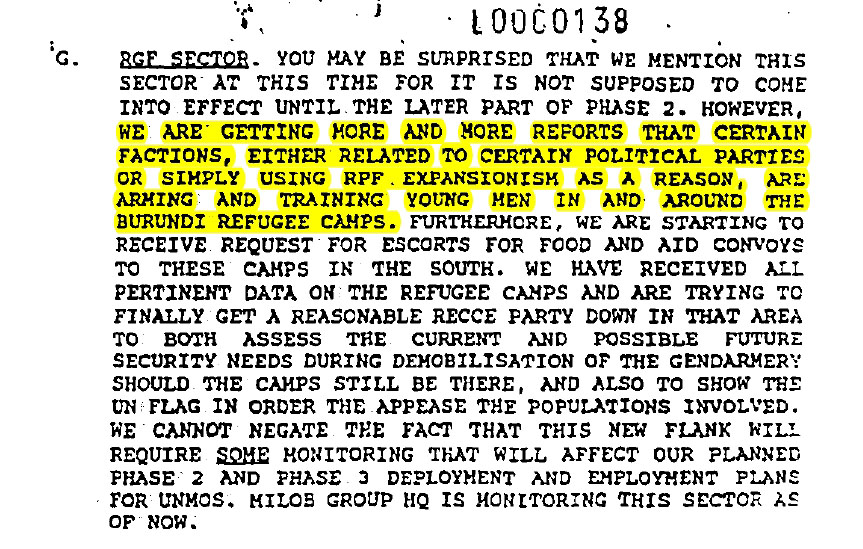RELATED POSTSThe Rwandan Crisis Seen Through the Eyes of France Warnings of Catastrophe The Rwanda Sitreps The Rwanda "Genocide Fax": What We Know Now The U.S. and the Genocide in Rwanda 1994: The Assassination of the Presidents and the Beginning of the "Apocalypse" The U.S. and the Genocide in Rwanda 1994: Information, Intelligence and the U.S. Response The U.S. and the Genocide in Rwanda 1994: Evidence of Inaction Lessons Learned from U.S. Humanitarian Interventions Abroad
IN THE NEWSBritain ignored genocide threat in Rwanda The Shroud Over Rwanda's Nightmare "The Rwandan Genocide," Letter to the Editor, The New York Times "The Rwandan Genocide," Letter to the Editor, The New York Times
|
 Burundian refugees in Rwanda following assassination of President Melchior Ndadaye, October 1993. Credit: B. Press/UNHCR Washington, DC, March 31, 2014 – During the months leading up to the genocide in Rwanda, United Nations officials and western diplomats became increasingly concerned by the threat to political stability posed by millions of refugees and internally displaced persons in the Great Lakes region. Attempts by the international community to address the refugee crisis became enmeshed in political in-fighting inside the country. Documents posted today by the National Security Archive and the Simon-Skjodt Center for the Prevention of Genocide at the United States Holocaust Memorial Museum show that the refugee crisis was compounded by a lack of reliable intelligence and a shortage of military personnel and international monitors. An ambitious refugee resettlement program negotiated as part of the Arusha accords by the Hutu-led government of President Juvenal Habyarimana and the Tutsi-led Rwandan Patriotic Front was never actually implemented. Today's posting is the 5th in a series of a joint "#Rwanda20yrs" project co-sponsored by the Archive and the Museum to mark the 20th anniversary of the genocide in Rwanda. The documents are drawn from the records of the United Nations peacekeeping force in Rwanda, known as UNAMIR, and State Department records released in response to Freedom of Information Act requests from the Archive. The Archive still has 33 pending requests with the State Department for key records about the Rwandan genocide, in addition to the many other requests pending with the Clinton Library, Defense Intelligence Agency, Central Intelligence Agency, and Department of Defense, along with records from the French and Belgian national archives that we still do not have access to. 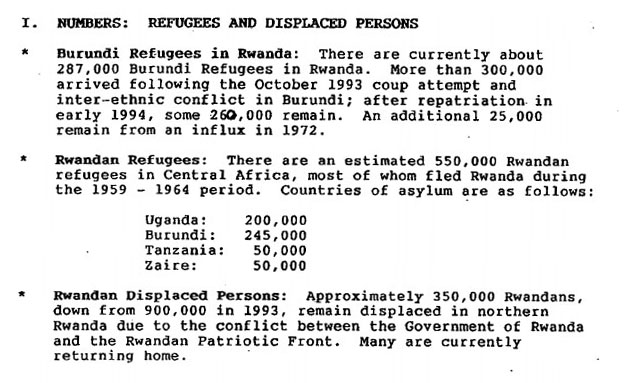 A State Department "refugee fact sheet" issued in March 1994 (above) on the eve of the genocide summarizes three overlapping refugee crises in Rwanda and neighboring Burundi: 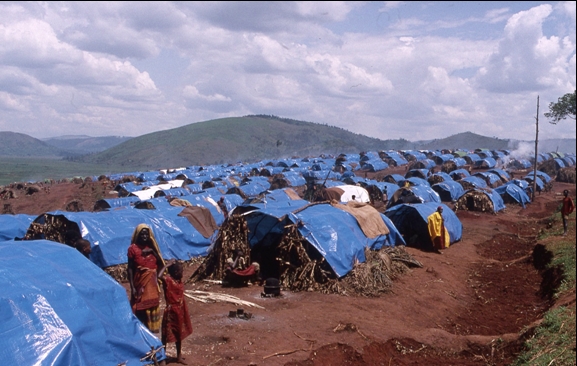 Burundi refugees in Butare prefecture, southern Rwanda, December 1993. Credit: M. El Khoury/UNHCR.
Each of these three groups had their own distinct grievances and aspirations, dating back many decades. The Tutsi diaspora served as a natural recruiting ground for the Rwandan Patriotic Front. According to a former U.S. diplomat in Kigali, Joyce Leader, Hutu refugees from Burundi were "radicalized" by their experiences and were "potential recruits" for the Interahamwe militia groups who were responsible for some of the worst episodes of the genocide.
The documents published today show that international officials devoted considerable diplomatic attention to the Rwandan refugee problem. A protocol settling refugee issues was signed in June 1993, as part of the Arusha negotiations. Instead of implementing the agreement, U.N. peacekeepers were overwhelmed by a fresh wave of refugees from Burundi following the October 1993 assassination of President Melchior Ndadaye. The documents suggest that U.N. officials were wary of providing assistance to Tutsi refugees and internally displaced persons in northern Rwanda for fear of creating a "pull factor" that would result in even larger numbers of refugees. (See Document 10) 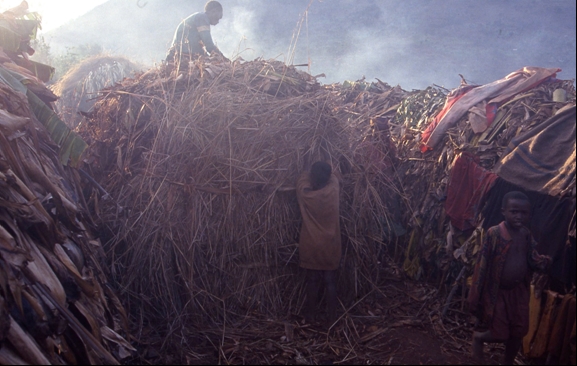 Burundi refugees in southern Rwanda, October 1993. Credit: B. Press/UNHCR.
THE DOCUMENTSDocument 1
"Protocol of Agreement between the Government of Rwanda and the Rwandese Patriotic Front on the Repatriation of Rwandese Refugees and the Resettlement of Displaced Persons" Initialed in a blaze of optimism, the refugee protocol recognized the "indisputable right" of Rwandan refugees to return to their country of origin "without any precondition whatsoever." It also established a timetable for resettlement efforts linked to the establishment of a new, broad-based transitional government, or BBTG. Since the transitional government was never established, the protocol was never implemented.
Document 2
In early October 1993, the President of Rwanda, Juvenal Habyarimana, reviewed the status of the repatriation program with US diplomats during an official visit to Washington. He said the Rwandan government was issuing passports to Rwandan exiles, and urged the United Nations to step up its assistance and resettlement efforts.
Document 3
Just three days after taking up his new post in Kigali, UNAMIR commander Romeo Dallaire cited the influx of some 200,000 refugees from Burundi as an additional headache in his first situation report to New York. He mentioned signs of "ethnic frictions" in the refugee camps, and expressed concern about a lack of resources to deal with the overall refugee crisis, which could "destabilize peace implementation plans."
Document 4
In a dispatch from Kigali, U.S. ambassador Robert Flaten reports that the arrival of predominantly Hutu refugees from Burundi (now estimated at 375,000) could create political problems inside Rwanda. He states that embassy officials are "gaining an understanding of the intimate link between what happens in Burundi and the security situation in Rwanda."
Document 5
Ambassador Flaten reports on rumors of "military recruitment activity" by Hutu nationalists from Burundi (known as Palipehutu) following the attempted coup in Burundi. He acknowledges that the United States lacks concrete information about the situation in the camps.
Document 6
Reporting on the situation inside the RGF (Rwandan government forces) sector, Dallaire cites further reports of political factions "arming and training young men in and around the Burundi refugee camps." (See Point G, Page 6.) He adds that UNAMIR is attempting to get a "reasonable recce party" into the area "to show the UN flag," but needs more military monitors. In a 2003 book, Shake Hands with the Devil, Dallaire recalled that his superiors had rejected a request for a further 48 unarmed observers to help monitor the situation in the refugee camps. (Page 181.)
Document 7
According to the U.S. embassy in Kigali, the UN High Commission for Refugees has become deeply concerned about security in the Hutu refugee camps in southern Rwanda. Meanwhile, an American aid worker reports sighting a group of young men in military uniforms at a refugee camp, including one with "a rocket launcher on his shoulders."
Document 8
The US embassy in Kampala provides an update on the Rwandan refugee situation. An international "plan of action" for Rwandan refugees is reported to be "on hold" pending the formation of a transitional government, which has been blocked by internal political disputes.
Document 9
After visiting a camp for Burundian refugees in southern Rwanda, UN Special Representative Jacques-Roger Booh-Booh reports that the "humanitarian emergency" in the country is reaching "catastrophic proportions." He reports that the refugees are becoming "increasingly restive" and concerned that nobody is paying attention to their plight.
Document 10
The newly-arrived U.S. ambassador to Rwanda, David Rawson, reports that the Rwandan government is "totally unprepared" to begin receiving predominantly Tutsi returnees from Uganda. He adds that planning for the refugee returns "has been stalled for nearly two years," with the exception of the Arusha refugee protocol, which exists only "on paper. " He reports that the UNHCR is reluctant to help Tutsi returnees in northern Rwanda for fear of being swamped by more refugees.
Document 11
The U.S. embassy in Kigali reports that the failure to form a new transitional government is delaying a resolution to the refugee problem. (See Paragraph 16.) Some exiles are returning spontaneously. International agencies are wary of providing assistance to long-term exiles to Uganda for fear of creating a "pull factor" that will overwhelm their technical abilities.
Document 12
According to a fact sheet prepared by the Department of State, an estimated 580,000 Burundians fled to neighboring countries after the October 1993 coup attempt, of whom approximately 200,000 returned home. The UNHCR reported high death rates (six per 10,000 every day) among Burundian refugees in Rwanda.
Document 13
A State Department fact sheet traces the history of the refugee problem in Rwanda back to the overthrow of the Tutsi monarchy in Rwanda in 1959, and the forced exodus of the former Tutsi elite.
Document 14
An analysis by the Bureau of Intelligence and Research (INR) for the U.S. State Department notes that nearly three million Rwandans and Burundians — out of a total population of 14 million — have fled their homes since 1990. (See paragraph 19.) It predicted that the "centuries-old" friction between the Hutu and Tutsi ethnic groups was "unlikely to fan violence" beyond the immediate region, but would "impede development and fuel demands for international humanitarian assistance."
Document 15
Deputy Assistant Secretary of State for African Affairs Prudence Bushnell visited Rwanda in March 1994, two weeks before the onset of the genocide. She was briefed by UNHCR special envoy Michel Moussalli who stressed the need to form a new Rwandan government to address refugee issues.
Additional Documentation of the Refugee Crisis in Rwandan before the Geoncide in April 1994Document 16
Document 17
Document 18
Document 19
Document 20
Document 21
Document 22
Document 23
Document 24
Document 25
Document 26
Document 27
Document 28
Document 29
Document 30
|

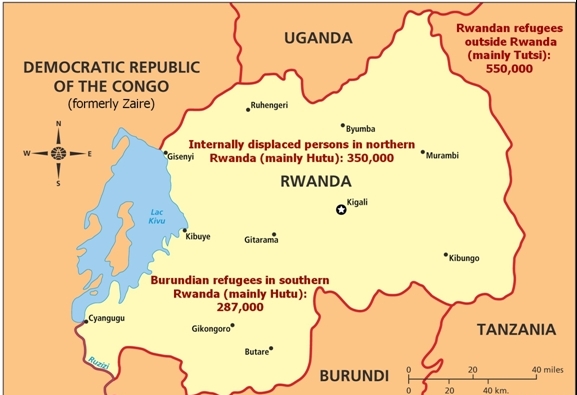
Refugees in Rwanda as of March 1994, map edited by Kristin Scalzo.
|
The Rwandan Refugee Crisis: Before the GenocideNational Security Archive Electronic Briefing Book No. 464Posted March 31, 2014 Edited by Kristin Scalzo For more information contact: |


